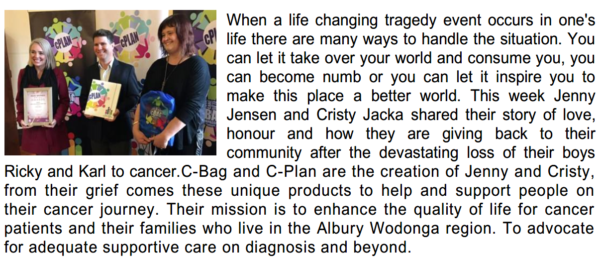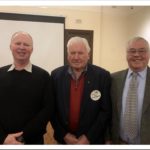
Category Archives: Sundry
Web Site
The Rotary Club of Albury Hume's web site has been in recession for some time. But now we are beginning to revive it to provide information about being a Rotarian.
So come back soon. Meanwhile check out the new Rotary theme song "All Shoulders to the Wheel"
All Shoulders to the Wheel - Lachlan McIntyre, Mica Torre, Stephen O'Connell and the chorus by members of the Rotary Club of Albury North.
℗ 2021 Stephen O'Connell and Lachlan McIntyre (both members of the Rotary Club of Albury Hume)
Released on: 2021-06-16
Guest Speakers

Guest speakers were from the Rotary Club of Albury North, with the topic being “The Drought”. Roger Paterson, Bill MacDonald and Andrew Hore all made passionate speeches which were personal and factual accounts of the effects that drought is having on their lives. Despite the fact that we have had good rain over the past few weeks, we are a long way from things being ok. Roger told us that his farm has been in the family for 97 years and that this is the worst drought ever. A telling sign of the drought is the fact that their main dam is 12 metres deep when full. At the moment, it is down to 1/2 metre deep.
He spoke of hidden costs associated with the drought, which include cartage and pumping of water. For example, the strain on Rotary Club of Albury Hume
District 9790 pumps is immense, so the family needs to have multiple pumps to prepare for the almost certain scenario that one will fail at an inopportune time. Overall, the drought has cost over $180,000 in lost income in the past year. Adding to this is the fact that costs have risen in excess of $300,000 over the same period of time. Roger told us that planning for drought is an important part of running a farm. However, this drought is off the charts and no amount of planning could take into consideration the severity of this particular event.
Bill went on to tell us that his family originally took possession of the property in 1863. There is a spring on their farm that feeds Sweetwater Creek, which is currently dry. The only other time that this has happened was in 1916. He also told us that there is an old farm saying that if the rabbits are breeding, then there’s a good year ahead. The rabbits aren’t breeding this year, which is a strong indicator that things aren’t looking good for the upcoming season. Andrew made the point that mental fatigue is an everyday reality of dealing with drought. Just like humans need more than one feed a day, animals need proper feeding routines. This means that Andrew and his family need to be out and about feeding stock seven days a week. There are no days off to rest and recuperate. This can lead on to mental health issues as farmers struggle with the realities of the worst drought on record. Let’s do all we can to look after our farmers, because without them, we wouldn’t hav
Kitenden Update by Howard Hinde

The attached photo show the Kitenden preschool children with eggs produced by the chicken preschool Chicken Farm.
For newer club members Kitenden is a Massai village located in the foothills of Mt. Kilimanjaro in Tanzania. Your Club together with 34 individual Sponsors have provided the funding for total operation of the pr since 2013 – thus we are now entering our 7th year of support.
The project educates young Massai (aged 3 to 5) to prepare them for Primary School. Massai have their own language – Maa – howe Primary School teaches in the Tanzanian National language of Swahili, thus the preschool teaches the Swahili as well as basic English and Numeracy skills.About 50 children attend the preschool each year and about 35 progress to Primary School, as ma children are very young and are at the preschool for 2 years. They are fed two meals every day. The school has 6 employees – 2 teachers, 2 cooks, a gardener and a security guard.
We decided to construct the Chicken Farm at the preschool so as to provide protein in the childrens’ diet and also teaches them how to look after the chickens and may encourage other Massai to look at egg producing as a business.The Farm took quite some time to build. Nothing happens quickly in Tanzania! It must be secured from animals – particularly birds. A few of us involved refer to it as the Hilton Hen House! However, it is now achieving its primary purpose – which is evident from the children’s smiling faces.
Guest Speaker

Kevin Davy was born in Wollongong N.S.W., the eldest son of a metallurgist chemist from whom he gained an early interest in earth sciences. As a youngster, he commenced his collecting items of interest to him such as philately and rocks. His employment took him to Broken Hill which was then Australia’s premier mining community. It was there that he commenced his passion for the collecting of mineral specimens and attending courses related to earth sciences. Colleting took him to many other mining localities throughout Australia with a desire to visit overseas localities. Over a period of some twenty years his collection grew to such an extent that it became difficult to house and he made the decision to
sell. After the sale he realised that he missed being involved in the mineral world and he decided to travel in search of suitable speciments for Australian collectors, Institutions and Museums.
Kevin was asked to locate fossils and this then became, together with scientific instruments, another part of his business.
